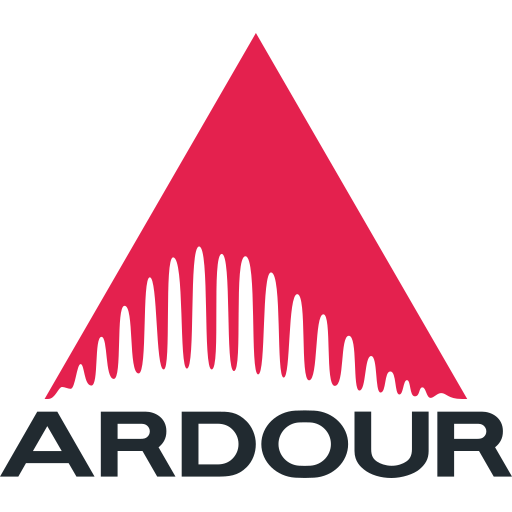Digital Audio Workstation (DAW) for people who want to record, edit, mix and master audio and MIDI projects. When you need complete control over your tools, when the limitations of other designs get in the way, when you plan to spend hours or days working on a session, Ardour is there to make things work the way you want them to.
Lol spending hours and days is correct but for me it was spent on trying to get the signal from your interface to actually reach the program and then figure out why there’s so much latency.
Were you able to reduce the latency to acceptable levels?
I just switched to Reaper. This was a couple years ago so maybe it’s better now, I don’t know.
I’ve been trying to use Ardour for the first time as part of my ongoing process of replacing all the proprietary software in my workflow to open source software. My hope is that Ardour can replace Audition and/or ProTools for me, but as of right now I’ve struggled a lot with how to even use the program. I probably just need to immerse myself in some tutorials haha
I’ve tried a lot of different DAWs already, Cubase/Nuendo, ProTools, Logic, Reaper, FL Studio, Bitwig, Ableton, Studio One, just to name a few. I’ve worked professionally only with Cubase, Pro Tools and Logic. I hated every minute I used Logic. Cubase being the best for composing and Pro Tools for recording and mixing. Studio One is very mature right now and that’s what I’m testing, since they now have a Linux beta. I tried Ardour before and unfortunately it doesn’t come even close to being as good as a “real” professional DAW. Even Logic was more pleasant to use than Ardour. I really wanted to like it, but it was not a very pleasant experience.
There is a YouTube channel called “TekSyndicate”. The dude wants to switch to Linux so bad, but he always complains about the lack of professional software to create his music on on Linux. Would this app be enough for him? I don’t know anything about creating music, but thought I’d ask if some of you do know music stuff.
I have a much easier time using REAPER rather than Ardour.
Bitwig is by far the best option on linux rn. Ardour is too barebones and focused on recording rather than midi
He mentions something about the software he uses on windows and how he has purchased a ton of “plugins” which, again, I have no idea what they are.
For plugins there is “yabridge”
Which I assume is a pain to make work on Linux?
I mean it works pretty flawlessly for me and I make music all the time. Some plugins don’t work the best but most of them are working well
As a professional music composer myself and working on Linux with Ardour, I’d say it is overall pretty good since many years. If you don’t like midi in Ardour you can use another soft to runs midi notes. On Linux the good thing is that if you don’t like something you can change, specially with audio softwares.
To me the two major issues with professional music on Linux are :
-
Proprietary plugins for virtual instruments are a nightmare (hard to make them to work, expensive on machine’s resources and unreliable),
-
Most company still think free software = unprofessional/amateur, which can make it harder to get jobs.
All I hear about is those damn plugins.
It’s a real issue because, technical aspect aside, lots of instruments cost a lot of money and are necessary to keep up with the trend. Also theses plugins can save you a lot of time, meaning you can provide more music on short time (effect plugins are concern as well here).
Do you have any recommendations for anyone looking to switch from windows DAW to a Linux DAW? Are there any tips regarding getting the plugins to play nicely?
I would love to switch to Linux on my desktop, but the only thing holding me back is that I use FL Studio with the Arturia V collection and I feel as though it would be nightmarish to try to get such a thing working in Linux.
Fruity Loops doesn’t have any easy equivalent on Linux. I’d say try reaper and ardour as they provide windows binaries. Be careful LMMS isn’t a FL clone, it’s midi only.
For the Arturia plugins you can install them with wine and use yabridge to make them compatible if they are not in vst compatible format (ardour can take vst2 and vst3 but sometimes it will not work). You can also have a dedicated PC for instruments (it is what I do) on windows (using audio gridder). Gotta test the Linux server version of audio gridder to see if I can go back to linux on m’y second PC. Or you can just send the midi notes to pc2 then get the audio out to pc1.
It’s doable to make proprietary plugins run on Linux but the reliability is the nightmarish part, as an update can break the wine compatibility and it can take a few mins/hours to restore.
Depending on what you do, the professional options are REAPER as a standard DAW and Bitwig Studio for more sequencer-based worflows.
Not sure about plugin availability though.
-
So in terms of DAW (Digital Audio Workstation), Linux already has Bitwig, Reaper, Arour, LMMS, and possibly others. Personally, I find the bigger issue comes from plugin developers (the DAW is your main program, and you add your sounds/effects through plugins). Most companies are not delivering anything Linux native. Many of these plugins can be bridged with compatibility software, and will work fine that way. However, most of these plugins now are also using their own install/activation software center, and they are often a nightmare in Linux.
Music production is the one thing I currently keep a windows mini PC around for these days. It’s not impossible to make the transition to Linux, but the last thing I want when pursuing a creative endeavor is technical software challenges holding me up.
That’s basically what the dude says in his videos. Such an unfortunate thing to see, honestly. I wish I could make such software.
This seems like a good use for a VM, no?
Is the plugin software VM hostile?
The plugins would almost certainly work in a VM, but I imagine that latency would become a big headache. For my purposes, I picked up a Beelink mini pc and called it a day.
I don’t know much about DAWs beyond messing around in them but I have a w11 VM with a recent nvidia card passed through (VFIO) and latency is not a concern in the slightest.
Was your experience with no graphical acceleration? It makes a world of difference. KVM/QEMU is also a good bit more performant than something like virtualbox if that’s your frame of reference
Ive been wanting a mini PC for a while now, enjoy your beelink!
Ardour is definitely professional grade, but I must say that it’s far from simple to setup. First, you may not have the latest version available in you SW repository and you would have to compile it yourself! Then, despite all the progress brought by pipewire, audio config in Linux is complicated and unreliable, especially for this time of work, requiring different audio devices, MIDI control interfaces and VSTs.
I am not an audio professional, I’m an amateur, and found myself demotivated by the amount of work required until I am ready to create music, and finally gave up :(
I’m sorry to hear that. That’s actually unfortunate. I wish I knew how to create a piece of software for folks who need it. :/
I don’t use Ardour because the prebuilt binary costs, but I think it’s the best form of open source project.
Arch linux official repos seem to have prebuilt binaries ready to install: https://archlinux.org/packages/extra/x86_64/ardour/
Debian/ubuntu got binaries in their repository.
I think there is also flatpak version which is also non-paid
I haven’t played around with Ardour for a while. Might test this new release
In Linux there are already much better options than Ardour that I highly suggest to try:
- REAPER as a standard DAW and Ardour equivalent.
- Bitwig Studio for more sequencer-like worflows (alternative to Ableton Live, FL)
These are not hobbyist products, we are talking about professional level software here, so they are both paid.
In any case REAPER is usable for free if you don’t use it commercially and it’s so cheap for the value it brings that there are no excuses for not buying it.
Not seen this before, looks like Audacious on steroids. A bit like Photoshop vs MS Paint.










